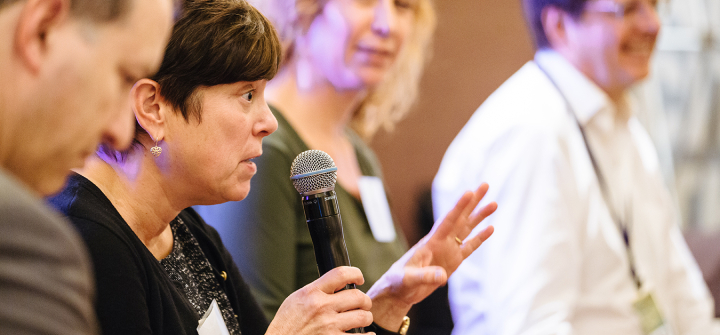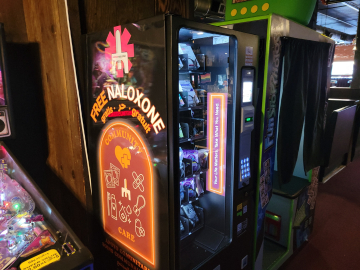Reversing the Decline in America’s Health
WASHINGTON – Today’s shocking CDC announcement that US life expectancy has declined for 3 years has added extra urgency to a summit of policymakers, experts, innovators and others gathered in the nation’s capital to discussion public health solutions.
Kelly Henning, who directs public health programs for Bloomberg Philanthropies, says the inaugural Bloomberg American Health Summit is all about convening big thinkers to propagate solutions to big problems like gun violence, obesity and opioid addiction. In an exclusive Q&A with Global Health NOW, Henning explains how the Bloomberg American Health Initiative is forging nontraditional partnerships, why this summit differs from other public health conferences and which promising interventions to look for.
The summit is hosted by hosted by the Initiative, which was created in 2016 with a $300 million gift from Bloomberg Philanthropies to the Johns Hopkins Bloomberg School of Public Health, which publishes Global Health NOW.
What differentiates this summit from other public health conferences?
This is a great opportunity for people to come together and really talk about what are the key public health issues in the United States now that are resulting in a decline in life expectancy. That’s really the basis of the Bloomberg American Health Initiative and that’s the principle that surrounds the discussions: What’s the scope of the problem, what are the key factors and what can we do about them?
As you know the focus of the Bloomberg American Health Initiative and the summit are really about violence prevention, addiction/overdose, adolescent health [and] disconnection, environmental health issues, and also obesity and the food supply. Those are the broad topic areas that underpin the whole initiative.
They’ll all be discussed over the next 2 days.
You’ve got a lot of big names, policy experts. You have a governor, a US senator, a mayor—a lot of high-profile people here. Why?
This is the first summit for the Bloomberg American Health Initiative. This is the kickoff event. We want to bring as much attention to the issue as possible. We think a lot of people in the health space and outside of health may not be aware there’s a decline in life expectancy in the US, and these are the principal drivers behind that decline.
What’s the goal for today’s summit?
Bloomberg Philanthropies really likes to bring people together, minds together, good thinkers together. We really like to convene those kinds people to have deep discussions. We hope this is the first step in lot of networking and connections.
Of course, we’re always about the data so we hope people will learn about the data presented here as well.
From gun violence to addiction to climate change and other issues, summit participants are taking aim at massive challenges that are tied in up socioeconomics, inequality—what will it take to drive real change?
This Bloomberg American Health Initiative is obviously based at the Johns Hopkins Bloomberg School of Public Health, and we think Johns Hopkins is going bring rigorous, state of art thinking and research to these problems. There is also a big educational element. There are master’s of public health students that are coming from communities that are highly affected by these health problems. And the School is not only going to be training these students but connecting to their home institutions. Over a short period of time, you’ll have a large network of organizations, students and those connected to the School who are working toward the same goals. It’s very innovative. I don’t think it’s been tried before—this idea of connecting home institutions, students and school.
And nontraditional partners like police departments as well?
Of course, there are students and collaborators from departments of health around the country, but we really wanted the Bloomberg American Health Initiative to include nontraditional partners [like] NGOs, other sectors … school districts, fire departments—different affected communities so we can learn from each other and hear those voices from other parts of the country.
How will you know if the summit has an impact?
I think we’re going to see an increase in dialogue about the problems, we’re going to see a lot of ongoing relationships among attendees and we’re going to hopefully see a lot of innovative ideas come out the summit that can be acted on not only by Hopkins but others in attendance.
What interventions that will be discussed need to be scaled up? Any faves in there?
I think there will be discussions about important medically assisted treatment of those with opioid addiction. I think there will be discussion about assuring that we address inequity in all of these health areas. We want to make sure we don’t leave people behind and those communities most affected are having a voice in the research and the solutions. I think we are going to hear about interesting work going on around the food supply and things that could be put in place to reduce obesity like menu labeling and food labeling. I expect there will be a lot of really exciting things discussed.
Ed. Note: This interview has been edited for clarity and length.
Join the tens of thousands of subscribers in more than 100 countries who rely on Global Health NOW summaries and exclusive articles for the latest public health news. Sign up for our free weekday enewsletter, and please share the link with friends and colleagues: http://www.globalhealthnow.org/subscribe.html
Kelly Henning discusses urban health issues in a 2017 panel in Paris. (Image: Courtesy)





